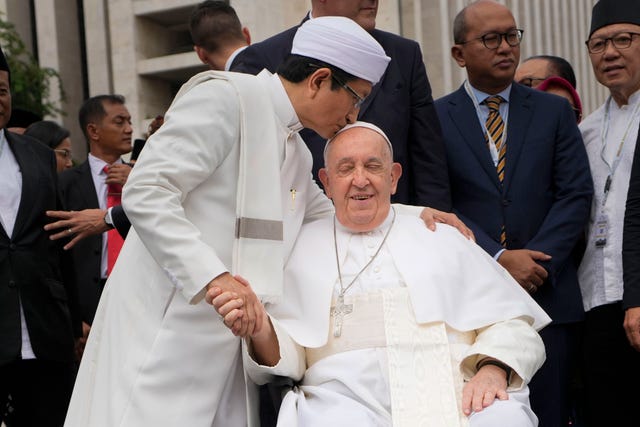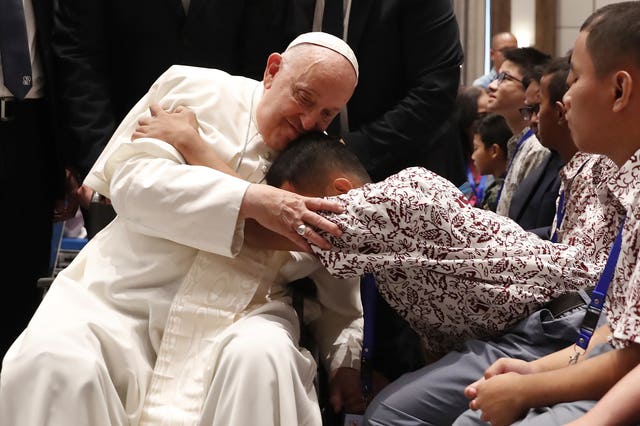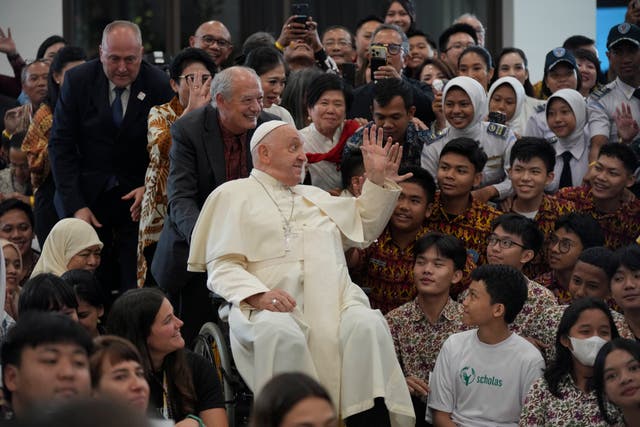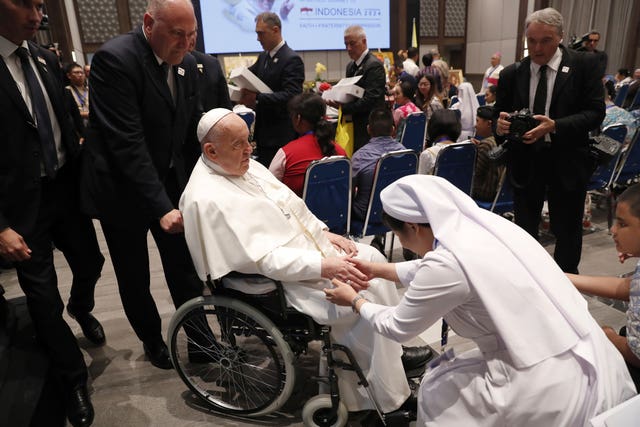Pope and Imam of south-east Asia’s largest mosque make joint call for peace
Pope Francis and Grand Imam Nasaruddin Umar called for interfaith friendship and common cause during the Pope’s visit to Indonesia.

Pope Francis and the Grand Imam of south-east Asia’s largest mosque have vowed to fight religiously inspired violence and protect the environment, issuing a joint call for interfaith friendship and common cause at the heart of the Pope’s visit to Indonesia.
In an encounter rich with symbolic meaning and personal touches, the Pope travelled to Jakarta’s iconic Istiqlal Mosque for an interreligious gathering with representatives of the six religions that are officially recognised in Indonesia: Islam, Buddhism, Confucianism, Hinduism, Catholicism and Protestantism.
There, he and the Grand Imam, Nasaruddin Umar, stood at the ground-level entrance to the “Tunnel of Friendship”, an underpass which connects the mosque compound with the neighbouring Catholic cathedral, Our Lady of the Assumption.

Indonesia, which has the world’s largest Muslim population, has held out the tunnel as a tangible sign of its commitment to religious freedom, which is enshrined in the constitution but has been challenged by repeated instances of discrimination and violence against religious minorities.
From January 2021 to July 2024, there were at least 123 cases of intolerance, including rejection, closure or destruction of places of worship and physical attacks, Amnesty International noted on the eve of Pope Francis’s visit.
Approaching the elevator to the tunnel, the Pope said it was a potent sign of how different religious traditions “have a role to play in helping everyone pass through the tunnels of life with our eyes turned towards the light”.
He encouraged Indonesians of every religious tradition to “walk in search of God and contribute to building open societies, founded on reciprocal respect and mutual love, capable of protecting against rigidity, fundamentalism and extremism, which are always dangerous and never justifiable”.
Francis travelled to Indonesia, at the start of an 11-day, four-nation trip to Asia and Oceania, to encourage Indonesia to combat religiously inspired violence and pledge the Catholic Church’s commitment to greater fraternity.
The meeting at the mosque showed the personal side of that policy, with Pope Francis and Imam Umar showing a clear affinity for one another.

As Pope Francis was leaving in his wheelchair, Imam Umar bent down and kissed him on the head.
Pope Francis then grasped the Imam’s hand, kissed it and held it to his cheek.
The event began with a similarly moving moment, as a visually impaired Indonesian teenage girl, Kayla Nur Syahwa, chanted verses from the Quran about tolerance among believers of different faiths.
Pope Francis has made improving Catholic-Muslim ties a hallmark of his papacy and prioritises travel to majority Muslim nations to further the agenda.
During a 2019 visit to the Gulf, Pope Francis and the imam of Al-Azhar, the 1,000-year-old seat of Sunni learning, launched a “Human Fraternity” movement calling for greater Christian-Muslim efforts to promote peace around the world.
More recently, Francis travelled to Najaf, Iraq, in 2021 to visit the top Shiite cleric, who delivered a message of peaceful co-existence.

The new initiative launched Thursday, called The Istiqlal Declaration, now becomes another pillar of Pope Francis’s interfaith push.
It was signed by the Pope and Imam Umar at a formal ceremony in the tent on the Istiqlal Mosque compound.
The other religious representatives at the encounter did not co-sign it but were listed by organisers as having “accompanied” it.
The document said religion should never be abused to justify violence, but should instead be used to resolve conflicts and protect and promote human dignity.
It also called for “decisive action” to protect the environment and its resources, blaming humanmade actions for the current climate crisis.
The interfaith gathering was the highlight of Pope Francis’s visit to Indonesia, which concludes later on Thursday with a giant Mass in Jakarta’s stadium which is expected to draw some 60,000 people.

Catholics represent about 3% of Indonesia’s population of 275 million, but the country is home to the world’s largest Catholic seminary and has long been a top source of priests and nuns for the Catholic Church.
Pope Francis is seeking to encourage their faith by becoming the third pope to visit Indonesia, after Paul VI in 1970 and John Paul II in 1989.
On Friday, Pope Francis heads to Papua New Guinea for the second leg of his trip, one of the longest and farthest in papal history, which will also take him to East Timor and Singapore before it ends on September 13.





